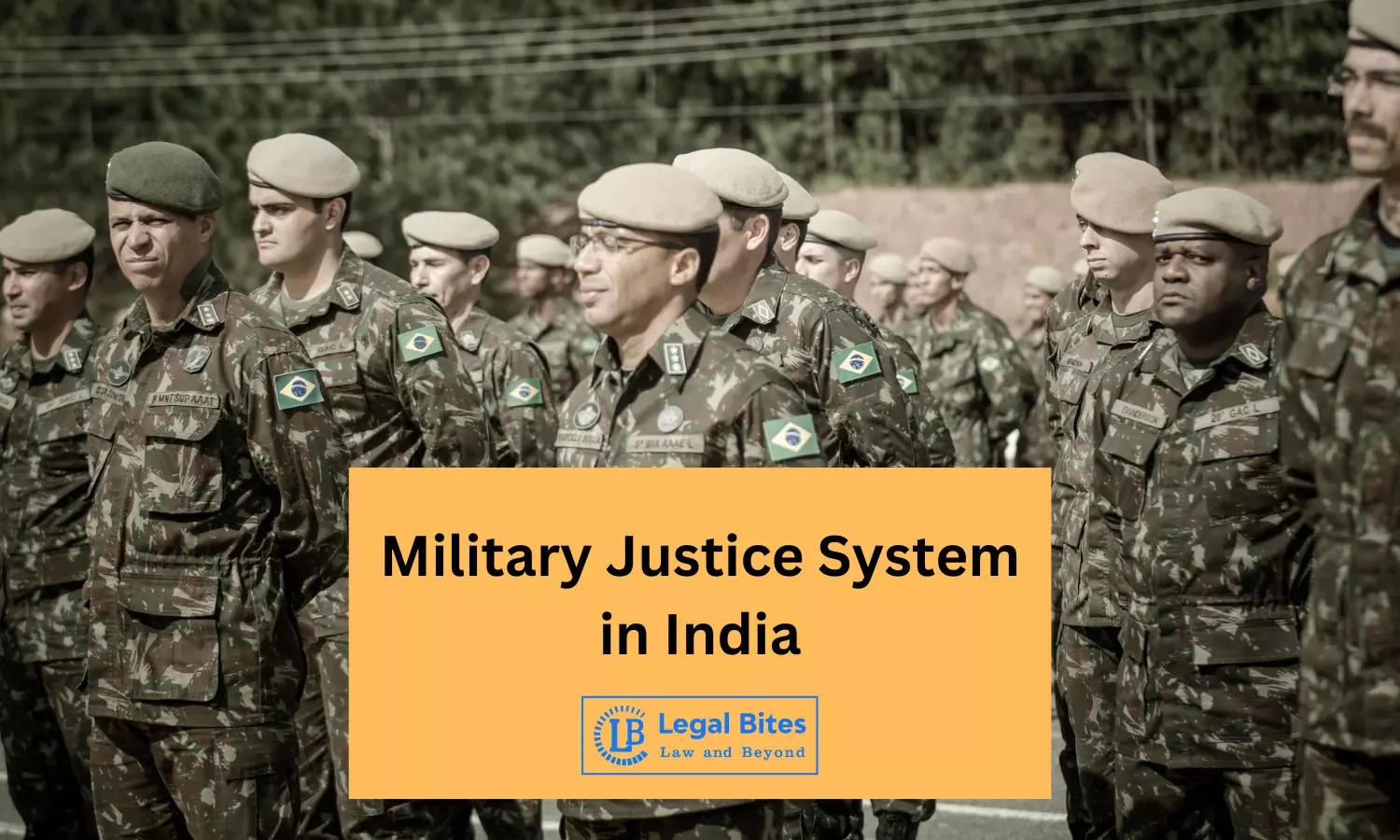Military Justice System in India
The Article 'Military Justice System in India' examines the composition and operation of the Indian military system.

The Article 'Military Justice System in India' by Snehil Sharma examines the composition and operation of the Indian military system. It also examines the various provisions of military law, as well as their applicability today and the extent to which certain rules are being implemented.
To maintain discipline among the serviceman and to uphold the highest standards of professional excellence, military law is a system designed for the representatives of the armed forces in general and the army in particular. But certain aspects of military law have been a matter of debate for a long time.
Introduction
The defense system of a nation is a powerful body defending itself from external threats. The country gets more powerful, the stronger its defense is. The military is considered the nation's strongest cornerstone. It consists of the army, navy, and marines, and is in charge of safeguarding and defending the nation.
The Indian military has historically kept its functioning differently from the general populace. In India, certain customs and traditions are openly observed. The Indian Army has its own sets of guidelines that govern the armed forces. The body of law and procedure that governs and controls a soldier's behaviour is known as military justice. To regulate the country's soldiers, there are various legislative bodies. The ways different nations handle their armed forces vary based on their national setting. Some nations have distinct and independent legislative bodies that govern their armed forces. On the other hand, several nations have various judicial structures and systems for carrying out justice.
Being one of the oldest legal systems in the world, the Indian legal system has a specific hierarchy and structure that are well-defined. Yet, the Indian military, of course, is a major exception to this. For resolving disputes, they have a different system. This distinct system is a long-standing remnant of the British Raj that is still in place and has mostly withstood the test of time.
Why Indian Military Justice System is segregated?
The establishment of a different system of adjudication for military personnel and offences involving the armed forces can be attributed to a number of factors. First, there is a need for a prompt and strong response or punishment given the nature of the armed forces and the essential role they serve. In other words, the civilian court system's numerous adjournments and delays cannot be allowed to bog down the military. To maintain order and consistency and to inculcate the necessary discipline that is synonymous with the military, quick trials and predictable decisions are essential. In turn, this permits the military to concentrate on its main objective, namely maintaining national security.
Historical Background
After the Mutiny of 1857, the Britishers created the system of military justice to "discipline" the people of India. It served as the foundation for the Indian Army Law of 1950, the Navy Law of 1957, and the Air Force Law of 1950. Only a small number of amendments were made to the British statutes before they were adopted by independent India.
Since then, The Army Act, Air Force Act, and Navy Act have been the driving force of military justice in India. These statutes specify that both men and women in uniform are covered by the legislative provisions. On the official website, use the search function to find all three of these Acts. There are some paramilitary forces in India as well that are governed by rules comparable to those that govern defense services. This covers the Assam Rifles Act, the Coast Guard Act, the Indo-Tibetan Border Police Force Act, and the Border Security Force Act.
Constitutional Provisions and Military law
The Indian Constitution primarily lists the regulations regulating the Indian military. According to Article 33, the parliament may legally restrict or abolish any of the fundamental rights of military personnel in order to uphold discipline and ensure the correct performance of their duty. The jurisdiction of the higher courts over court-martial orders, conclusions, and penalties is curtailed and limited by Articles 136 and 227 of the Indian Constitution.
Apart from the Indian Constitution, the Army Act of 1950, the Army Rules of 1954, the Navy Act, and the Air Force Act are the special legislations that were introduced with the intent to deal with the matters relating to their domains.
The Armed Forces Tribunal Act, which was passed in 2007, was hailed as a significant piece of legislation that permitted the establishment of the Armed Forces Tribunal (AFT). The Army Act of 1950, the Navy Act of 1957, and the Air Force Act of 1950 all grant authority to the tribunal to adjudicate and hear disputes and complaints relating to issues faced by members of the services, including commission, appointments, enrolments, and conditions of service regarding all individuals subject to those Acts. Additionally, it allowed appeals from decisions made by courts-martial held in accordance with the aforementioned Acts as well as from similar issues connected to them.
Judicial Pronouncements
There have been various instances when the Hon'ble have expressed their views regarding the military laws in India:
In the case of Ram Sarup v. Union of India and another, 1965 AIR 247, the plaintiff filed a petition with the Supreme Court asking for a writ of habeas corpus and certiorari about the repeal of the petitioner's constitutional right at the time of his Army Act trial. The Honorable SC determined that every clause of the Army Act is a piece of legislation enacted by Parliament. Therefore, even though a clause appears to violate the Fundamental Rights set down in Part III of the Constitution, it is nonetheless lawful. The court observed that the Parliament has made the necessary changes to affect the respective FRs in order to carry out its authority under Article 33 of the Indian Constitution. However, the Hon'ble Supreme Court did state that Article 14 of the Constitution was not violated and that Section 125 of the Act's provisions were not discriminatory. The Hon'ble Court also pointed out that it is undisputed that those to whom Section 125 and its provisions apply to constitute a distinct class.
In another case of Ous Kutilingal Achudan Nair and Others v. Union of India and Others, 1976 AIR 1179, the Honourable SC highlighted that Article 33 of the Indian Constitution, along with the right to form organizations or unions granted by Article 19(1)(c) of the Constitution, determines an exemption to the provisions of Part III of the proceedings.
In Secretary Ministry of Defence v. Babita Puniya, Civil Appeal Nos 9367-9369 of 2011, although considering the abrogation of women's fundamental rights under Section 12 of the Army Act 1950, the Hon'ble Supreme Court noted that women were not given permanent commissions from Short Service Commissioned Officers under the said provision. In not granting permanent commission to the women the court said that Article 33 of the Constitution authorizes Parliament, by statute, to decide the degree to which the rights granted by Part III of the Constitution are restricted/abrogated in their implementation, inter alia, by the representative of the Armed Forces, in order to ensure that their duties are properly discharged and that discipline is preserved among them
Defects in the Indian Military System
The Indian army has frequently faced criticism for upholding the customs of the British Raj and for not making enough of an effort to adapt to modern society and take the required steps to modernize its justice system. In light of it, the following are some shortcomings of the Indian military justice system:
• Relating to Bail: No bail is offered to military personnel who are arrested. Depending on their discretion, the commanding officer or higher military authority may opt to give it. The principles on which bail should be granted have been defined by the supreme court, however it is arbitrary and unfair to issue bail at someone's discretion, rendering Article 21 of the Constitution meaningless.
• Relating to Legal Aid: According to military regulations, an accused person is not permitted to hire a civil attorney to represent him or have a military officer known as the defending officer to defend him. A major violation of Article 21 occurs when there is no access to legal aid.
• Relating to Double Jeopardy: The constitutional bar against double jeopardy is enshrined in Article 20(2). It is possible to avoid a second trial for the same offence under the military justice system, but it is not possible to do so in a civil court.
• Relating to Members of Court Martial: Members, whether they are legally qualified or not, are not trained to administer justice. They do not exercise their judgement properly and independently throughout a trial since they are subject to diverse commanding influences.
Reforms in the Military Justice System
In the area of human rights, judicial activism has typically kept both the fairness of the courts-martial and the conditions of service of aggrieved military people apparent. The protections provided to the accused and the mindset of those in charge of running the military justice delivery system both have significant flaws. The justice system is regarded as a component of the executive branch and is actually only a tool used by the executive branch to impose coercive discipline. Saying that there is no need for legal reform since few individuals are impacted by military law or because military personnel has deliberately accepted the current system with all of its problems is wrong.
The judicial system for the armed services should implement a process that not only is transparent and objective but also pursues a liberal interpretation of the principles of natural justice. While upholding organizational discipline must always be the fundamental goal of the military justice system, organizational performance must take precedence over punishing or shielding individual behavior.
Regarding the rights of the accused and general human rights principles, there is a definite trend toward change in the global military justice system. The establishment of standing courts, the right to legal representation, the expansion of the accused's ability to choose a trial over summary proceedings, etc. are some of the key aspects of this transformation that shall be introduced in the future.
Conclusion
The Indian military justice system is a holdover from a time when the Armed Forces needed to be independent since the battlefield was far away. No legal system can or ought to function in a vacuum, ignoring the shifting social standards. Just establishing an appeal tribunal won't revitalize the outmoded military justice system. It necessitates the inclusion of essential protections based on global legal standards in light of other democracies' global experiences. Therefore, to develop a sound justice delivery system, it could be more prudent to analyze the military justice system as a whole rather than make adjustments by setting up a "tribunal."
The system should be uniform across the three Services and serve as a roadmap for citizens engaged in nation-building. If the government is successful in transforming military law into something more contemporary and humanitarian, it will reassure military members that they are subject to the Indian Constitution's fair, equitable, and impartial justice delivery system.
References
[1] Devaansh Singh, Overview of Indian Military Justice System, Available Here
[2] Anshita Surana, A Glimpse At The Army Act, 1950 And Military Justice System Of India, Available Here
[3] Wing Commander U C Jha (Retd), Military Justice System in India, Available Here
[4] Diva Rai, Military Justice System in India, Available Here
[5] Pratap Alexander Muthalaly, How military courts function in India, Available Here
Important Links
Law Library: Notes and Study Material for LLB, LLM, Judiciary, and Entrance Exams

